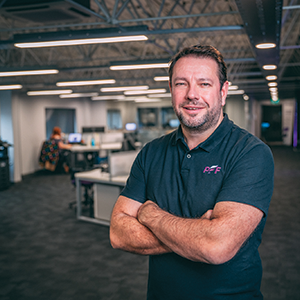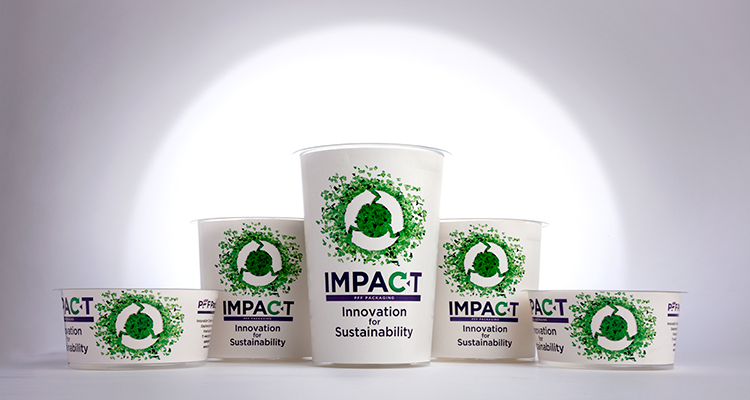How sustainability and innovation are engrained in PFF Group’s operations
We are all familiar with those life questions that sometimes require tough decisions. A huge question of this kind is looming over UK consumers; what is more important to us when considering our supermarket purchases – sustainable packaging, or low cost? Do we choose a more expensive, but sustainably packaged item, or a cheaper product in non-sustainable wrap? In the UK, the cost-of-living crisis has complicated this debate, and pressure is mounting on individuals who can afford to choose. So, what is the answer – do our environmental morals outweigh the desire for a bargain?

“My chickens cost me more than buying eggs, but it’s about the wider impact; yes, it may be slightly more expensive, but for me, the quality and sustainability outweighs the cost,” answers Kenton Robbins, Group Managing Director at PFF Group (PFF), one of the UK’s largest independent food packaging manufacturers. “We should be focused on doing the right thing, which is not necessarily the cheapest thing. We are now at the point where individuals and particularly corporations, must accept social responsibility and prioritize environment over outgoings.”
As a polymer converter, PFF is striving to demystify the world of sustainable packaging, offering the food industry an environmentally friendly process from start to finish. Its services include extrusion and thermoforming, dry offset printing, and injection molding, but with the common factor of being formed from food-grade recycled Polyethylene Terephthalate (rPET). This contains up to 90 percent recycled material, over 50 percent of which is post-consumer waste. On average, it converts over 6000 tons of post-consumer Polyethylene Terephthalate (PET) bottles and trays back into rPET food packaging every year – this equates to around 600,000,000, 500 milliliter bottles being repurposed!
Informing consumers
Aside from food packaging, PFF was selected by the UK Department for Health and Social Care to manufacture disposable aprons, supplying the UK’s National Health Service (NHS) with much-needed Personal Protective Equipment (PPE) throughout the COVID-19 pandemic. Proud to support the NHS, the company invested in new machinery and dedicated an area of its site to the constant production of aprons. It also rebranded as PFF Group (formerly PFF Packaging) to reflect its work in both the food and health industries.
Returning to the food industry, Kenton explains: “Consumers are smarter than ever with regards to sustainable packaging, and environmental considerations are becoming increasingly important in every aspect of our lives. However, some consumers are still manipulated into incorrectly thinking certain products are more sustainable than others. We must overcome this by eradicating greenwashing from the market, bringing an understanding of the total lifecycle and carbon footprint of a product to the forefront of the industry.”
Informing consumers of a product’s total lifecycle is exactly what PFF’s own innovation, IMPAC-T, is striving for. IMPAC-T is a ground-breaking, fully recyclable composite pack produced from rPET, that is suitable for dairy and an array of other food products. It offers a 46 percent carbon footprint reduction compared to the mainstream option, according to independent research carried out by Comply Direct. IMPAC-T provides an opportunity to revolutionize packaging, not only in the dairy industry, but any food sector where sealed-in freshness is essential.
Innovative technology
The company’s emphasis on sustainability does not stop at its products though, as it provides clear, concise information on every step of the manufacturing process regarding sustainability initiatives. In 2022, for example, the company dramatically cut its carbon emissions by installing a £50,000 hybrid adiabatic cooling system at its Sedgefield site, which supplies cool water for its production processes.

In addition, its Keighley site received a certificate of recognition from Operation Clean Sweep in 2020, to recognize PFF’s commitment to ensuring plastic waste does not end up in waterways. Furthermore, PFF is proud to send zero waste to landfill, instead considering waste as a precious resource. It recycles excess or unneeded materials, and those that cannot be recycled are diverted to Refuse Derived Fuel facilities to be converted into energy for heating and electricity.
Since we last spoke to Kenton, PFF has acquired Sirap UK (Sirap), a leading producer and supplier of thermoformed rigid food packaging. “We have a reputation for taking on challenges that other businesses have walked away from,” states Kenton. “But Sirap was an ideal opportunity for us to expand in the thermoforming sector and to manufacture a wider variety of products for a more diverse range of customers. We spent most of 2022 integrating the new sites, combining resources, and implementing innovative technology.
“Utilizing our additional space from the acquisition, we have recently purchased a new, state-of-the-art Kiefel Speedformer 78.2 Power, which is an absolutely amazing piece of kit, as well as 11 further thermoformers,” he continues. “Although it initially takes more time and effort to implement, we are gradually shifting away from a traditional packaging workforce based on labor, and towards a technology-based team.”
Made in Britain
Kenton has another update for us too – PFF has joined the Made in Britain campaign. This group brings together British manufacturers under the widely recognized Made in Britain mark and encourages consumers to use the campaign’s directory and website to find British-made goods and brands.
“Joining the Made in Britain group reinforces our goal to utilize polymers that are available in the UK,” says Kenton. “British businesses should be sourcing products from as close as possible, both to reduce environmental impact and contribute to the economy. At PFF, we are constantly identifying areas where there is potential for a better solution, whether that be cheaper, closer, or more sustainable.”
Strategic growthWe are all familiar with those life questions that sometimes require tough decisions. A huge question of this kind is looming over UK consumers; what is more important to us when considering our supermarket purchases – sustainable packaging, or low cost
However, Kenton is realistic about the challenges facing the manufacturing industry as we move through 2023. “We are seeing a landscape that is very different to previous years, with customers experiencing financial challenges, payment dates stretching in all areas, and major retailers refusing to hold stock,” he explains. “Sometimes, you must accept that it is going to be a difficult year and instead focus on building business for the future.
“This is especially difficult when you have sales that are being eroded by changing retail behaviors,” he continues. “It was the first time in my 25 years of working in the food industry, that I have seen such a lack of confidence and uncertainty from retailers heading into the Christmas period. Through 2023, our focus therefore is on alleviating this nervousness, by driving new customers and technology, pursuing new projects, and providing a clear example of what hard work looks like.”
Kenton adds: “As a privately-owned business, another challenge is deciding where to allocate capital. We need to balance the long-term strategic view with the short-term emotional needs of an entrepreneurial-led business. While it is difficult, challenges and problem solving is what makes business enjoyable – if it were easy, it would be dull and unrewarding!”
Turning to the future, Kenton is humble and honest about his aims. He concludes: “We are a family-owned organization that has all the drive, passion, and expectations of a typical business, but we are ultimately focused on growing something for the future. There’s no pressure to deliver shareholder returns every day of the week, instead I need to ensure the organization grows in the right direction for future stability.”
